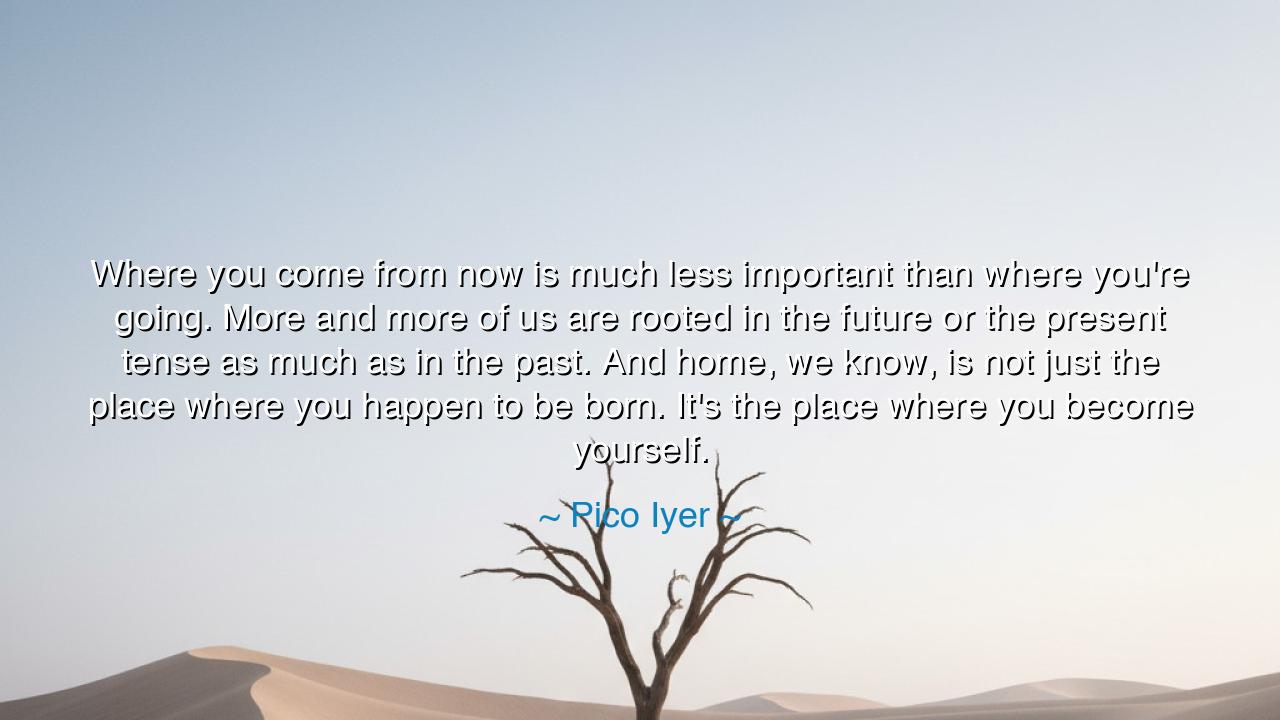
Where you come from now is much less important than where you're
Where you come from now is much less important than where you're going. More and more of us are rooted in the future or the present tense as much as in the past. And home, we know, is not just the place where you happen to be born. It's the place where you become yourself.






"Where you come from now is much less important than where you're going. More and more of us are rooted in the future or the present tense as much as in the past. And home, we know, is not just the place where you happen to be born. It's the place where you become yourself." These profound words from Pico Iyer invite us to consider the fluidity of identity and the ever-changing nature of home. Iyer challenges the notion that our origins define us, suggesting instead that who we are is shaped more by our journey and the path we choose to follow. In the ancient world, the idea of home was often tied to the place of birth—the land of one’s ancestors. But as Iyer reminds us, home is not a static, fixed place; it is an evolving space where we discover and forge our true selves.
In the ancient Greek world, identity was often deeply rooted in the land and the family from which one came. Homer’s epics, The Iliad and The Odyssey, are filled with tales of heroes whose personal journeys were bound to their homeland, their ancestry, and their duty to their families. Odysseus, in particular, embodies the hero’s return to home—his quest was as much about returning to his roots as it was about surviving and discovering who he truly was. However, there is also a deep yearning within Odysseus to transcend his origins, to become more than just a man defined by his place of birth. Through his trials, he learns that home is not merely the physical place where one is born, but the journey and the experiences that shape one’s true self.
The Romans also understood that one’s identity could transcend their birthplace. Cicero, the great Roman orator and philosopher, often spoke about the idea of virtue and duty to the Republic, suggesting that one’s true home was not the land of birth but the values and the principles one lived by. For Cicero, identity was linked to the pursuit of honor, the commitment to justice, and the duty to uphold the welfare of the state. His words remind us that the essence of who we are is often determined not by where we come from, but by the values and actions we take in our lives.
In more modern history, the story of Mahatma Gandhi mirrors this understanding of home as a place where one becomes themselves. Gandhi was born in India, but his true identity was not forged in the confines of his birthplace. Rather, his journey as a leader, a reformer, and an advocate for nonviolent resistance defined his home as the Indian subcontinent and the principles of freedom and equality. Gandhi's vision of home was shaped not by geography, but by the transformative journey of self-discovery and the fight for justice. His legacy was rooted not in where he was born, but in what he stood for and how he helped shape the future of his nation.
Similarly, the life of Nelson Mandela underscores the idea that home is not bound by place but by the journey of becoming oneself. Mandela, though born in a village in South Africa, found his true home in the struggle against apartheid and the fight for racial equality. His identity was not shaped by the land of his birth but by his dedication to justice, peace, and reconciliation. His imprisonment and years of sacrifice were part of the process of becoming the leader who would unite a divided nation. Mandela's story teaches us that home is where we fight for our beliefs, where we forge our identity, and where we find purpose in shaping the future.
The lesson in Iyer’s words is one of self-determination and transcendence. Where you come from does not define you; rather, it is your choices, your journey, and your actions that shape your future and your identity. The concept of home is not static, bound to a specific place or time; it is dynamic, malleable, and shaped by the life you choose to lead. Whether through adventure, learning, or struggle, you define your own path, and in doing so, you carve out a home that reflects your values and growth.
In practical terms, this means that we must be willing to embrace the present and future, not as something dictated by our past, but as an opportunity for growth and reinvention. Don’t let your past or origins limit the potential of what you can become. Like Gandhi, Mandela, and the ancient philosophers, we must strive to transcend the limitations imposed by our backgrounds and focus on what we can contribute to the world. Each day is an opportunity to create the future and to define your home not as a place where you’re confined, but as the space where you can become yourself. Just as Iyer encourages, we must be grounded in the present and future, shaping a new home that reflects our values, our actions, and our purpose.






AAdministratorAdministrator
Welcome, honored guests. Please leave a comment, we will respond soon